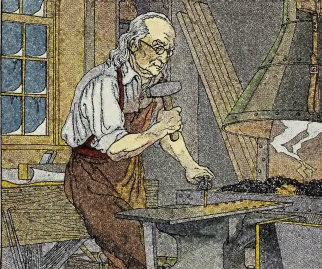Great slabs of iron were unloaded for him at the wharf, and for days no one saw him.
and from morning until night people heard ringing blows on iron coming from it as if it were the shop of some country blacksmith.
從早到晚,人們都聽(tīng)見(jiàn)鐵器響亮的撞擊聲,仿佛那是個(gè)鐵匠鋪?zhàn)印?/div>
No one could explain what Benjamin Franklin was doing, though.
然而,沒(méi)人能解釋本杰明·富蘭克林在做什么。
In the middle of the winter Beth and William and their mother went to a friend's house to stay for a week.
仲冬,貝絲、威廉和阿諾德太太去朋友家住了一個(gè)星期。
Mrs. Arnold was not well, and their house was very cold.
阿諾德太太身體不舒服,他們的房子冰冷冰冷的。
The week for which they were invited became two, then three.
他們?nèi)チ艘粋€(gè)星期、兩個(gè)星期、三個(gè)星期。

"We must go home," Mrs. Arnold said at last. "
“我們必須回家,”阿諾德太太最后說(shuō)。”
Mr. Franklin said that he would stop this after- noon and help William carry the carpet-bag.
富蘭克林說(shuō),中午他會(huì)來(lái)接我們,幫威廉提旅行袋。
It is time that we began our work again."
是時(shí)候重新開(kāi)始工作了。”
As they took their homeward way through the snow, they noticed again the happy smile on Mr. Franklin's kind face.
當(dāng)他們穿過(guò)雪地回家的時(shí)候,他們又注意到富蘭克林慈祥的面容上露出幸福的微笑。
He held the handle of the bag with one hand and Beth's chilly fingers with the other.
他用一只手握住提包的把手,另一只手握住貝絲冰冷的手指。
He was the spryest of them all, as they hurried on.
路上,他是他們當(dāng)中最活潑的一個(gè)。
They understood why when they opened the door of their home.
打開(kāi)家門(mén)時(shí),他們明白了為什么
They started, at first, wondering if they had come to the wrong house.
起初,他們開(kāi)始懷疑是不是走錯(cuò)了。
No, there, just as they had left them, were the rows of shining copper pans on the wall,
沒(méi)有錯(cuò),他們離開(kāi)時(shí)墻上一排排閃閃發(fā)光的銅盤(pán),
the candlesticks on the mantelpiece, the warming pan in the corner, and the rag rugs on the floor.
壁爐上的燭臺(tái),角落里的加溫鍋,地板上的破布地毯都還在這。


